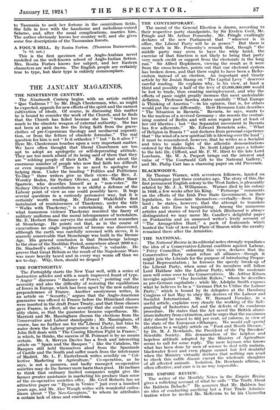THE FORTNIGHTLY.
The Fortnightly starts the New Year well, with a series of instructive articles and with a much improved fount of type. " Augur " discusses "Balance of Power," pointing out the necessity and also the difficulty of restoring the equilibrium of forces in Europe, which has been upset by the new military preponderance of France. Another anonymous writer, in an article on "Security," argues that the Anglo-American guarantee was offered to France before the Rhineland clauses were inserted in the draft Peace Treaty, and that these clauses gave France, in effect, all the security that she could reason- ably claim, so that the guarantee became superfluous. Mr. Marriott and Mr. Massingham discuss the elections from the Conservative and Labour standpoints; Mr. Massingham, of course, has no further use for the Liberal Party, but tries to water down the Labour programme in a Liberal sense. Mr. John Bell deals with "The Coming Election Fight in France," in which, he thinks, the success of M. Poincare is by no means certain. Mr. A. Mervyn Davies has a fresh and interesting article on "Spain and the Basques " ; like the Catalans, the Basques still hold themselves aloof from the Spaniards of Castile and the South and suffer much from the intolerance of Madrid. Mr. L. F. Easterbrook writes sensibly on "Col- lective Marketing in Agriculture." Co-operation, as he says, is not a panacea, and badly managed co-operative societies may do the farmer more harm than good. He inclines to think that ordinary limited companies might give the farmer greater assistance in marketing his produce than some of the co-operative societies offer. Mr. Cecil Roberts has an attractive paper on "Byron in Venice" just over a hundred years ago, and Mr. Alec Waugh writes with wonderful enthu- siasm about "The Neo-Georgians," to whom he attributes a certain lack of ideas and emotions.






































 Previous page
Previous page